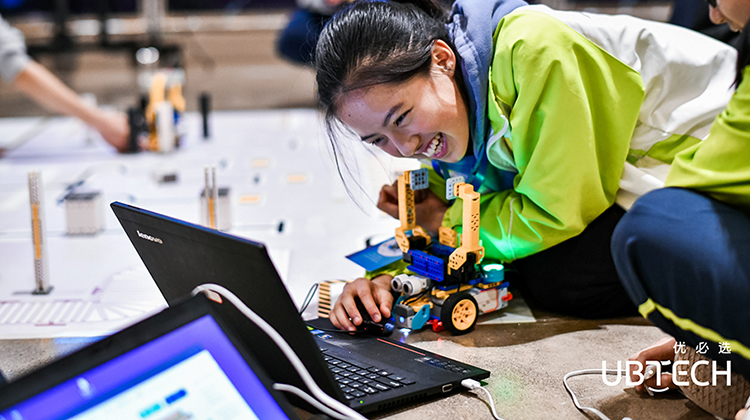A ready-made curriculum for teaching AI

AI is the next disruptive technology, maybe the most disruptive of all, it’s already touching and revolutionising pretty much everything from marking papers to finding your way around town.
That much is known, what is not widely understood is how AI works and how can you get started learning about it, especially at the pre-tertiary stage.
UBTECH has been a player in robotics for years now, they’ve been active at every level in the field, you’ve got to love their quirky Jimu robot kits. Most recently the company provided the robots that have been instrumental in China’s virus response, warning people on the streets to wear masks and spraying disinfectant. A different model, AIMBOT, worked in hospitals offering initial consultations to newly arrived patients.
AIMBOT is being flown to Australia for a trial in a hospital, it can take the temperatures of 200 people per minute, removing some of the risk to front-line healthcare workers.
"AIMBOT can go through 200 people in a minute and identify which patients are the ones in need and who needs the most attention," UBTech ANZ country manager Natasha Huang said.
The company has long been involved in robotics education and have now put together a curriculum that’s been written with K-12 in mind that will introduce the learner to AI.
UBTECH was the first company in China to commercialise humanoid robots for everyday use, which has given it insight into the AI algorithms for them. That means their AI curriculum is founded upon real applications and was jointly developed with East China Normal University (ECNU), one of the most prestigious universities in China which has strong ties with the Chinese Academy of Sciences.
The AI curriculum system includes nine books; AI Zootopia, AI Smart Life, AI Transformer Workshop, AI Majic World, AI Super Engineer, AI Future Town, AI Super Designer, The Application and Exploration of AI and AI Super Assistant.
The program sought to address two major problems in AI education; the shortage of standards and scientifically-researched content for AI curriculum in China and most other countries and the lack of a systematic AI curriculum running from primary school through to high school.
Some very heavy hitters were involved in the curriculum’s development; Prof Ren Youqun from the ECNU, who also serves in the AI tech innovation expert group of China's Ministry of Education, ECNU Prof Wang Jiqing and Xiong Youjun, the Chief Technology Officer of UBTECH edited this series of AI curriculum books.
The AI curriculum uses project-based Learning (PBL) and 5E learning methods to help students acquire knowledge and skills which link to real world AI applications.
Students can design their own waste sorting system using uKit building kit, or attain a basic understanding of Internet of Things (IOT) through the smart home simulation via the AlphaMini humanoid robot and uKit building home program. Lesson plans are available for each book of the AI curriculum.
UBTECH offers both online and offline training for teachers and will issue related certificates to them when they have qualified. The company offers all of their education solutions worldwide, except in North America which uses a different education approach.
For more details: https://www.ubtechedu.com/global/case-1.html
The company has established a presence in AI academics in Australia, partnering with Sydney University to launch an AI research center in June 2017. The UBTECH Sydney AI Center aims to bring researchers from different academic fields together to collaborate on AI and is led by Professor Tao Dacheng, who is a leading light in the field.
The center will also facilitate collaboration between the public and private sectors by collaborating with government and technology companies to solve real-world problems. It will also seek to cultivate the next generation of AI researchers through PhD programs that involve academic and industry training and collaboration.
The official website is at https://www.sydney.edu.au/engineering/our-research/data-science-and-computer-engineering/ubtech-sydney-artificial-intelligence-centre.html